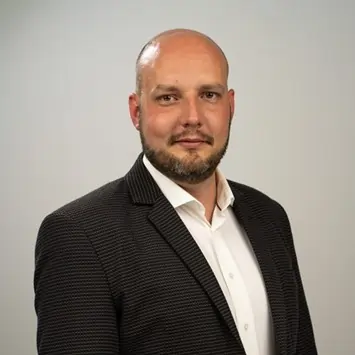
Denmark’s specialist accelerator DTL-Q delves into quantum science, as part of NATO initiative

INTRO: A Danish initiative aims to unlock the power of quantum science, accelerating development of this disruptive technology that could produce computers, communications devices, and sensors that are far more powerful than those currently available, reports Richard Staines.
At the heart of the Deep Tech Lab – Quantum (DTL-Q) is the potential of computers and related technologies that use subatomic particles for calculations.
Once the technology has been refined, quantum computers should be able to perform far more complex tasks than classical computers.
This is because quantum computers don’t rely on the classic binary system based on bits that have two values of 0 and 1. In contrast, quantum computers use subatomic particles such as electrons to create quantum bits (qubits) to transmit information. This qubit can be in a “superposition” of one and zero simultaneously until its state is measured, increasing computing power dramatically.
Qubits also exploit another property of quantum particles, which can become “entangled”. Meaning their states are always related no matter how far apart they are – for instance if one entangled particle’s spin is “up”, the other’s will always be “down”.
This ability to exist in multiple collective states at once creates possibilities for complex calculations that are impossible with classic computers.
For example, one area where classic computers struggle is to describe the mysterious world of quantum physics, where binary logic requires the brute force of many processors to predict how particles may behave.
But using quantum logic, which is derived from particles similar to those being investigated, it should be much easier for quantum computers to describe the subatomic world and discover further scientific insights.
There are also quantum products already on the market, notably the atomic clocks that have been around for decades and have now been refined to give ultra-precise time measurements for use in GPS systems and other applications.
Other quantum products are also available, such as gravimeters and accelerometers – but there could be much more to come once the technology has been developed and scaled down so it can be used on a large-scale commercial basis.
Disruptive projects
Denmark-based Deep Tech Lab – Quantum is a new initiative from BioInnovation Institute (BII) in Copenhagen which leverages world-leading research in quantum physics. The program aims to support early-stage companies based on quantum and quantum-enabling technologies with programs tailored for this field and with the same goal of ensuring that they too can realize their full commercial potential.
DTL-Q aims to foster emerging and disruptive quantum science projects and has selected its first six companies for this independent accelerator.
Through its affiliation with the DIANA Center for Quantum Technologies, DTL-Q will also be part of the DIANAQ Accelerator Network established by NATO. Thus, the lab is the first part of Denmark’s contribution to NATO’s Defence Innovation Accelerator for the North Atlantic.
The initial cohort, comprising six innovative start-up companies, will gain access to a network of top-tier trusted investors, business mentorship, and education from expert staff, and state-of-the-art testing opportunities in BII’s office space and laboratories. (See Box)
Cathal Mahon, Chief Business Officer at DTL-Q, said: “There is a growing awareness that the societal challenges we are facing cannot be solved by software alone: there is a need for radically new technological developments if we are to effectively address them. Quantum technologies is one of these technologies.
“But it will not happen of its own accord if left entirely to the private capital markets: the financial risk is perceived to be too high.”
Mahon pointed out that markets and their focus on financial risks are struggling to cover “existential risks” – the price of inaction and failing to implement a new technology.
For example, one of the startups in the initial cohort is looking specifically at a defence-oriented project that will use quantum and classical hardware and algorithms to defend and protect against threats.
Mahon added: “DTL-Q’s role is to facilitate the migration of deep tech research into economically viable companies, by embracing the early-stage technological and market risk.”
Mahon added that aside from quantum computing, future technologies could also be derived from quantum computing and quantum sensing. Quantum communication will make it possible to communicate securely, as quantum computers will not be able to hack a quantum internet.
Quantum sensing will radically improve the sensitivity of a broad range of sensing technologies, and make it possible to perform new types of sensing that are not currently possible.
Quantum computers are already in existence – at the beginning of December 2023, IBM unveiled the first computer with more than 1,000 qubits, the equivalent of the digital bits in an ordinary computer.
But the focus is now on making machines that are error-resistant, an issue that is holding back development of the technology.
At the moment, error correction is sucking away the computing power needed to perform tasks, with around 1,000 qubits needed to error-correct each logical qubit. With current error correction techniques around a million qubits would be needed to create a computer with the equivalent number of effective qubits as a conventional binary computer.
IBM says it has a new error correction system that cuts the rate by a factor of 10 or more and will focus on this for future quantum chips.
Cooling down, down, down
Another issue is the vast amount of cooling required – for quantum chips to work they need to be maintained at a few thousands of a degree above absolute zero, and also shielded from any interference or heat from the surroundings.
One of the DTL-Q startups is working to solve this problem. Aquark Technologies (Aquark) is working on technology that allows continuous trapping of “cold atoms” needed for quantum sensing and related technologies.
At the moment the technology is cumbersome but the firm’s goal is to reduce its size and improve its accessibility so that it can be used in commercial applications outside of the lab.
Making its home in Southampton, UK, Aquark in October 2023 demonstrated cold atoms could be trapped while flying on a drone, a world first achievement that could support applications including navigation, precise measurements and situational awareness.
The entire system weighs less than 10kg and withstood freezing temperatures, high humidity fog, and complex manoeuvres, operating for an hour on internal power during full-day trials.
It uses one or two elements, such as Rubidium, in ultra-high vacuum conditions and precisely tuned lasers to confine and slow down atoms, allowing them to be manipulated into quantum states of superposition and entanglement.
Aquark’s CEO and co-founder, Andrei Dragomir PhD, said: “Starting from a cold matter system one could develop sensors for measuring time, gravity, rotation, acceleration, magnetic fields and electric fields, but also quantum memories for computing or communications and even can assist in the generation of qubits. But generating cold matter is a difficult task in itself and requires cumbersome systems generally occupying entire rooms. Aquark’s mission is to miniaturise this platform to something that would fit in the palm of a hand and make it mass producible.”
Jens Nielsen, CEO of BII, concluded that DTL-Q could draw on insights and experiences from a business model that has already begun to generate new technology in the field of life sciences.
He said: “One of the main challenges of working with early-stage quantum start-ups lies in the immaturity of the technologies themselves. However, by leveraging insights gained from BII’s successful collaboration with life science entrepreneurs over the past five years, quantum startups can draw valuable insights into navigating regulatory landscapes, fostering interdisciplinary collaborations, and ultimately bringing a product to market.”
“The Deep Tech Lab – Quantum initiative, modelled after BII’s proven Venture Lab program, offers start-ups a comprehensive support system, including access to a network of investors, business mentorship, educational resources from expert staff, and state-of-the-art testing facilities within BII. This accelerator marks a significant step in harnessing the commercial potential inherent in quantum science.”
BOX – the first six companies to enter Deep Tech Lab – Quantum
Astrolight uses high speed lasers to connect earth and space by uncovering capabilities for satellite connectivity and deep space exploration.
Aquark Technologies is a spin-out from the University of Southampton that provides portability and miniaturization solutions for quantum technology applications.
g2-Zero is developing single photon sources which are purely electrical, vibration-resistant, and alignment-free.
QUBITRIUM offers solutions to problems in quantum cryptography, communication, and quantum sensing.
Phantom Photonics – is developing a quantum-enhanced 3D imaging sensor which improves the range, resolution, power consumption, and acquisition time over state-of-the-art devices.
SECQAI is creating quantum and classical hardware and algorithms to defend and protect against threats.


